Besides Hamilton 68, three groups deserve condemnation for peddling the Russian-bots hoax: the media, corrupt politicians, and Twitter.
Margot Cleveland reporting for The Federalist
The latest chapter of “The Twitter Files” broke on Friday, with the release of internal communications that provided a takedown of Hamilton 68, which wrongly purported to expose Russian disinformation on social media. The details released, however, prove equally devasting to the corrupt media, dishonest Democrats, and Twitter itself.
Independent journalist Matt Taibbi’s most recent exposé provided more details of the internal angst at Twitter caused by Hamilton 68, which Taibbi described as “a computerized ‘dashboard’ designed to be used by reporters and academics to measure ‘Russian disinformation.’” As Taibbi explained, former FBI counterintelligence agent Clint Watts conceived of the dashboard, which the Alliance for Securing Democracy think-tank hosted. It then served as “the source of hundreds if not thousands of mainstream print and TV news stories in the Trump years.”
“Virtually every major news organization in America is implicated, including NBC, CBS, ABC, PBS, CNN, MSNBC, The New York Times and the Washington Post. Mother Jones alone did at least 14 stories pegged to the group’s ‘research,’” Taibbi stressed, adding, “Even fact-checking sites like Politifact and Snopes cited Hamilton 68 as a source.”
But there was a problem — a huge problem: “The Twitter Files expose Hamilton 68 as a sham.”
Exposed
The internal communications revealed that Twitter had reverse-engineered how Hamilton 68 supposedly tracked online Russian influence and determined the methodology relied on a list of some 644 accounts. Twitter executives then ordered a forensic analysis of those accounts and determined that only 36 were registered in Russia, many of which were connected to Russia Today, the government “news” service.
According to Taibbi, “the accounts Hamilton 68 claimed were linked to ‘Russian influence activities online’ were not only overwhelmingly English-language (86%), but mostly ‘legitimate people,’ largely in the U.S., Canada, and Britain.”
Email exchanges captured the problem, with Twitter insiders saying, among other things: “No evidence to support the statement that the dashboard is a finger on the pulse of Russian information ops.” “Hardly evidence of a massive influence campaign.” “These accounts are neither strongly Russian nor strongly bots.”
As Twitter executive Yoel Roth synthesized: “I think we need to just call this out on the bullsh-t it is.” But while Twitter brushed reporters and politicians off Hamilton 68’s Russian-bots storyline, the tech giant’s concern about “playing the long game” kept it from calling BS on the project.
[READ: The Astounding Saga Of Hamilton 68 Illustrates Scope Of America’s Institutional Rot]
In a devastating Friday thread and subsequent article, however, Taibbi did. So devasting was his reporting, it prompted Hamilton 68 to post a response framed as a “FACT SHEET: Hamilton 68 Dashboard (2017-2018).”
Taibbi, who had basically begged Watts and those connected to the Alliance for Securing Democracy (ASD) to speak with him before his “Twitter Files” reporting went live, was neither amused nor persuaded. He countered with his own response, saying: “After refusing to answer questions pre-publication, Hamilton 68 and Clint Watts printed a response to the Twitter files that’s both laughable and damning.” And he went on to add an addendum highlighting the changes Hamilton 68 made to its webpage’s discussion of the project.
These revelations prove devasting to Hamilton 68 and scandalous to the Alliance for Securing Democracy. But three additional groups deserve equal focus and condemnation for peddling the Russian-bots hoax: the media, corrupt politicians, and Twitter.
Media
Based on the Hamilton 68 dashboard, as Taibbi detailed, the legacy press ran “hundreds if not thousands of mainstream print and TV news stories in the Trump years” — a forgivable mistake, maybe, if the media had no reason to doubt the accuracy of the information. But they did because Twitter itself refuted Hamilton 68’s representations. “Off the record,” Twitter also “cautioned” reporters that they “should be very skeptical of ASD’s claims.”
For instance, when the media began reporting, based on the Hamilton 68 dashboard, that the trending of the #ReleaseTheMemo hashtag — a campaign that pushed for the declassification of then-Rep. Devin Nunes’ memo on FISA abuse — was the result of Russian bots, Twitter told reporters it had “been monitoring closely since #releasethememo started trending late last week,” and that the hashtag “appears to be organically trending.”
But as Twitter’s internal communications revealed, “Twitter’s efforts to privately nudge reporters away from the story failed miserably.” One Twitter employee seeking to steer reporters away complained in emails that “Reporters are chafing.” “It’s like shouting into a void,” Emily Horne wrote to her Twitter colleagues.
Even after Twitter responded publicly with a letter revealing that its internal investigation “has not identified any significant activity connected to Russia” regarding the hashtag, the press persisted in pushing the fake Russian-bot story. That same letter stressed that the #ReleaseTheMemo hashtag “was also used by several prominent, verified U.S. accounts on the evening of Thursday, January 18,” with Twitter adding, “Typically, hashtag use by high-profile accounts, including those with high numbers of followers, plays a role in driving conversations around a hashtag on Twitter.” Yet the corrupt press kept peddling the Russian-influence narrative.
The Federalist’s Mollie Hemingway recognized in real time what was happening, dissecting the media’s unreasonable reliance on Hamilton 68’s information. Even after Twitter publicly refuted Hamilton 68’s claims, the press “uncritically accept[ed] and promote[d] a secretive group’s unverified claim of a Russian conspiracy,” Hemingway stressed.
Americans should be outraged that our “free press” peddled Hamilton 68’s bogus claims of a Russian influence campaign, and every reporter who ran the unsupportable stories should be called out for pushing fake news.
Democrats
Likewise, the Democrats who fanned the claims of Russian interference based on Hamilton 68 deserve censure.
Rep. Adam Schiff and Sens. Dianne Feinstein, Richard Blumenthal, and Sheldon Whitehouse, among others, not only pushed the unfounded claims that Russian bots were behind the trending hashtags, but they also demanded that Twitter and other tech companies investigate and stop such supposed interference.
These Democrats and the others pushing the conspiracy relied solely on Hamilton 68 as a source and did so even though Twitter had refuted the claims. In fact, internal Twitter communications show executives tried to warn senator staffers that the Russian-interference story didn’t stand.
“It might be worth nudging Blumenthal’s staffer that it could be in his boss’ best interest not to go out there because it could come back to make him look silly,” one email suggested. We tried to “wave him off” because “we don’t believe these are bots,” said another. But Blumenthal and the other Democrats continued to scream about the supposed Russian operations, and for that they should be made to look silly.
Twitter
While Twitter did try to warn off the media and politicians, it also deserves an equal share in the blame for peddling the Russian-bots hoax because it knew Hamilton 68 was BS.
“We should have a separate discussion about if/when/how we confront ASD privately with our knowledge of their flawed methodology/dashboard and seek to help them reorient in a more accurate direction,” one Twitter insider wrote after Schiff and Feinstein began pushing the conspiracy theory.
Roth asked whether it was “now the time to go public with the fact that any given user only counts once towards a trend.” Another Twitter executive seemed fine with going public, writing: “If ASD isn’t going to fact check with us, we should feel free to correct the record of their work.”
But rather than clearly and unequivocally refute Hamilton 68, Twitter merely made hints off the record, thereby allowing both the media and congressional Democrats to mislead the public about Russia’s responsibility for various social media trends.
So, yes, Hamilton 68 deserves censure. But so too do the corrupt media and Democrats who pushed the Russian-bot hoax — and the Twitter execs who stood by while they did.










